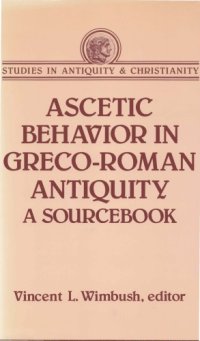
Ebook: Ascetic Behavior in Greco-Roman Antiquity
Author: Vincent Wimbush
- Genre: Religion
- Series: Studies in Antiquity & Christianity
- Year: 1990
- Publisher: Fortress Press
- Language: English
- pdf
In presenting a selection of twenty-eight texts in translation with introductory essays, Vincent L. Wimbush and his co-authors have produced the first book on asceticism that does full justice to the varieties of ascetic behavior in the Greco-Roman world. The texts, representative of different religious cults, philosophical schools, and geographical locations, are organized by literary genre into five parts that give a fascinating overview of the ascetic tradition.
Review from Amazon:
Asceticism is a dirty word in the modern west. People think it only applies to Buddhism and Hinduism but it was once common among Greco-Roman pagans, Jews and Christians. The word 'asceticos' is the Greek word for athlete. Ascetics challenged themselves by rejecting their passions and desires.
This book contains 28 texts and studies. The texts are either extracts that are exensive or fully translated. Four texts are pagan, three are Jewish, three are Christian Gnostic and the rest are mainstream Christian. The Life of Chariton by Leah Di Segni (Section 25) is a extremely valuable text. Chariton was a survivor of a persecution under Aurelian who founded the oldest monastery in the Holy Land (the Old Lavra) in the late 3rd century. I had heard mention of him in accounts of Palestinian monasticism but I was unaware that an ancient life existed. Other texts are from Jerome, Origen, Evagrius, Jacob of Serug and a host of anonymous writers. For the pagans you have Musonius Rufus, Stobaeus and the Cynic Epistles - all under rated writers that deserve a wider audience.
This is a brilliant source-book.
Review from Amazon:
Asceticism is a dirty word in the modern west. People think it only applies to Buddhism and Hinduism but it was once common among Greco-Roman pagans, Jews and Christians. The word 'asceticos' is the Greek word for athlete. Ascetics challenged themselves by rejecting their passions and desires.
This book contains 28 texts and studies. The texts are either extracts that are exensive or fully translated. Four texts are pagan, three are Jewish, three are Christian Gnostic and the rest are mainstream Christian. The Life of Chariton by Leah Di Segni (Section 25) is a extremely valuable text. Chariton was a survivor of a persecution under Aurelian who founded the oldest monastery in the Holy Land (the Old Lavra) in the late 3rd century. I had heard mention of him in accounts of Palestinian monasticism but I was unaware that an ancient life existed. Other texts are from Jerome, Origen, Evagrius, Jacob of Serug and a host of anonymous writers. For the pagans you have Musonius Rufus, Stobaeus and the Cynic Epistles - all under rated writers that deserve a wider audience.
This is a brilliant source-book.
Download the book Ascetic Behavior in Greco-Roman Antiquity for free or read online
Continue reading on any device:

Last viewed books
Related books
{related-news}
Comments (0)